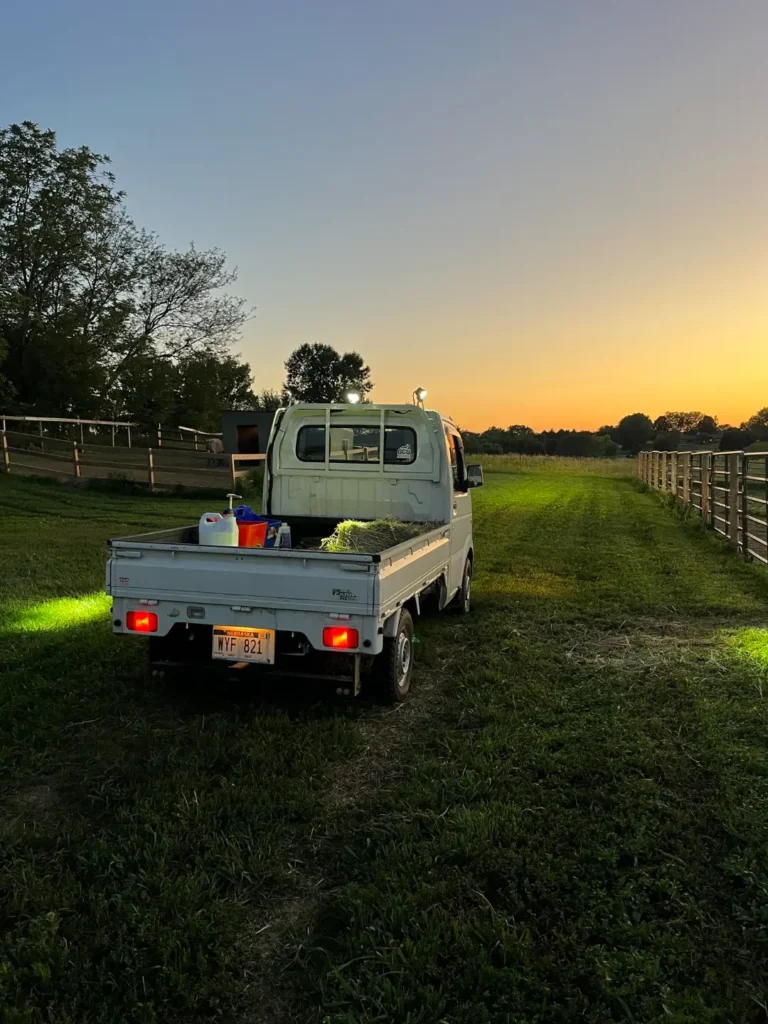Ever wondered about the power behind the renowned Honda Acty, a stalwart in the automotive industry since 1977? Intrigued by the engine specs of this nimble work vehicle that’s made a name for itself despite fierce competition? This comprehensive guide will clear up any questions you might have about the Honda Acty’s engine, exploring its unique specs, performance, and efficiency. We’re going to explore the different engine versions over its production span, the remarkable engineering behind it and how it stacks up against other Honda engines. Additionally, we’ll talk about maintenance tips, troubleshooting common engine problems, and the possibilities of engine modifications. By the end of this article, you’ll know what makes the Honda Acty a reliable, efficient, and practical choice for commercial use.
Understanding the Honda Acty Engine
Overview and Model History
The Honda Acty, a series of mini trucks and vans, has been a mainstay in the automotive industry since its debut in 1977. This vehicle, produced by the Japanese automaker Honda, was designed to be an economical and nimble work vehicle, primarily for the Japanese domestic market. Over the years, the Acty has seen several updates and improvements, with production carrying on until 2021.
The Acty’s main competitors included the Suzuki Carry, Daihatsu Hijet, Subaru Sambar, Mitsubishi Minicab, and the Mazda Scrum. Despite the competition, the Acty has carved out a niche for itself, thanks to its reliability, durability, and practicality.
Key Engine Specifications and Versions
The Acty has seen several engine iterations over its production span. The first generation, produced from 1977 to 1988, featured a 545cc 2-cylinder water-cooled engine known as the E05A. This engine churned out 28 PS (20.6 kW; 27.6 hp) of power and 4.2 kg⋅m (41 N⋅m; 30 lb⋅ft) of torque.
The second generation, produced from 1988 to 1999, introduced a 547cc 3-cylinder engine with 34 PS (25 kW) of power and 4.5 kg⋅m (44 N⋅m; 33 lb⋅ft) of torque. Later models were upgraded to a 656cc engine with 38 PS (28 kW) of power and 5.5 kg⋅m (54 N⋅m; 40 lb⋅ft) of torque.
The third and fourth generations, produced from 1999 to 2021, continued to use the 656cc engine, with power output slightly increased to 46 PS (34 kW; 45 hp) in the third generation.
The Remarkable Engineering behind Honda Acty
The Acty’s engine is tucked away in the rear of the vehicle, underneath the cargo bed. This unique placement aids in weight distribution and stability, contributing to the vehicle’s agility and maneuverability.
Despite its small size, the Acty’s engine is known for its reliability and durability. It’s fuel-injected, which improves fuel efficiency and performance compared to carbureted engines. The Acty’s lightweight construction and efficient engine design allow it to achieve impressive fuel efficiency, making it an economical choice for commercial use.
Comparison with Other Honda Engines
Compared to other Honda engines, the Acty’s engine is relatively small, with a displacement ranging from 545cc to 656cc depending on the generation and model. However, what it lacks in size, it makes up for in reliability and efficiency.
The Acty’s top speed varies depending on the generation and engine specifications, but it generally ranges from 65 to 71 mph. While it may not be the fastest vehicle on the road, it’s more than capable of handling city driving and light loads.
If you’re looking to make the Acty faster, modifications such as engine tuning, turbocharging, and performance upgrades can be done. However, it’s important to ensure that these modifications comply with local regulations and don’t compromise the vehicle’s safety and reliability.
The Honda Acty engine, while small, is a testament to Honda’s engineering prowess. It’s reliable, efficient, and capable, making the Acty a popular choice for those in need of a practical work vehicle.
Performance and Efficiency
How the Honda Acty Engine Performs on Road
The Acty, with its 660cc engine, is a versatile vehicle, capable of handling both on-road and off-road conditions due to its four-wheel drive capability. This adaptability makes it suitable for a variety of tasks, from commercial to leisure activities.
While the Acty’s engine is already efficient, those seeking to enhance its speed can consider modifications such as engine tuning and component upgrades. However, it’s essential to undertake these modifications with care and expertise to preserve the engine’s dependability and lifespan.
Fuel Efficiency Analysis
The Acty excels in fuel economy, with a fuel consumption rate of 5.5 L/100km in the 60 km/h mode. Its compact design and lightweight build further boost this efficiency. However, factors such as tire size, driving conditions, and vehicle modifications can affect the Acty’s fuel consumption. By maintaining optimal tire pressure, adhering to regular maintenance, and adopting conservative driving habits, you can optimize the Acty’s fuel economy.
Common Performance Issues and Solutions
Over time, the Acty may encounter mechanical issues if not adequately maintained. These can include timing belt malfunctions, gear grinding in manual transmission models, and starting problems often linked to the car battery or a faulty spark plug or ignition system. Rust can also be a concern, particularly when the vehicle is parked outdoors and exposed to elements that promote rusting.
Regular maintenance and proper care can help extend the engine’s lifespan and ensure optimal performance. For instance, worn timing belts can be replaced, gear system damage can be repaired, and rust can be prevented with appropriate care and storage. Promptly addressing these issues is crucial to preserving the Acty’s durability and performance.
Maintenance and Troubleshooting
Keeping your Honda Acty in top shape requires attention to a few key areas.
Regular Maintenance Tips for Honda Acty Engine
Oil changes are a fundamental part of maintaining your Acty. After warming up the engine, transmission, and differential oils with a drive, it’s time to change the oil. The Acty is partial to 10w30 oil, requiring 3 quarts when changing the filter and 2.8 quarts otherwise.
The Acty employs a short filter identical to the factory Honda part. The fuel filter should be replaced every 24,855 miles (40,000km).
Certain parts of your Acty engine require regular replacement. The water pump and timing belt should be changed at 80,000kms or 7 years, whichever is sooner. The center link bushing, a common failure point on Honda Actys, can be purchased separately for cost savings.
Troubleshooting Common Honda Acty Engine Problems
Your Acty may encounter mechanical issues over its lifespan. These can include overheating, timing belt failure, ignition coil failure, and oil leaks. Regular maintenance and prompt repairs can help you avoid and address these problems.
Unusual noises, smells, or performance issues should be investigated and resolved promptly. Neglecting minor issues can often escalate into larger, more costly repairs.
Finding Quality Replacement Parts
When sourcing replacement parts for your Acty, it’s crucial to opt for quality parts that will endure. Various packages are available, such as a timing belt kit that includes the belt, seals, tensioner, and idler pulleys, an ignition tune-up package for smooth operation, and a filter tune-up package for efficient performance.
When to Call a Professional: Honda Acty Repairs
While some maintenance and repairs can be performed at home, there are instances when professional help is necessary. If you’re grappling with persistent issues with your Acty engine, or if you’re uncertain about a repair, it’s advisable to consult with a professional mechanic. Their expertise and experience can help diagnose and resolve complex engine issues, ensuring your vehicle remains safe and reliable on the road.
Investing in the maintenance of your Acty engine contributes to the longevity and performance of your vehicle. Regular maintenance and prompt repairs can help ensure your Acty continues to run smoothly for many years.
Engine Modifications
Popular Honda Acty Engine Modifications
Engine swaps are a prevalent modification, replacing the existing engine with a more potent one, significantly enhancing your vehicle’s power. Turbochargers are another common addition, increasing the engine’s efficiency and power output, but it’s worth noting that this could impact your fuel consumption.
For those frequently navigating challenging terrains, transitioning the transmission system from 2-wheel drive to 4-wheel drive can be transformative. This modification bolsters your vehicle’s adaptability on rough roads, but it’s a complex and costly procedure that necessitates changing the gearbox.
Benefits and Limitations of Modifying the Acty Engine
Engine modifications can provide additional power and performance, enhancing your vehicle’s capabilities both on and off-road. However, potential downsides exist. For instance, turbochargers can boost power, but they might also lead to increased fuel consumption. Similarly, transitioning to a 4-wheel drive transmission can enhance adaptability, but it’s a complex and expensive procedure.
Cost of Engine Modifications
The expense of modifying your Honda Acty engine can fluctuate greatly depending on the modification type. An engine swap or turbocharger addition can be quite pricey, while smaller modifications like upgrading the air intake system or exhaust system can be more budget-friendly. It’s crucial to consider your financial situation and seek expert advice before deciding on any modifications.
Necessary Precautions for Engine Modifications
Certain precautions should be taken when modifying your Honda Acty engine. Firstly, always seek advice from a professional mechanic or tuner before making any modifications. They can provide invaluable guidance and ensure that the modifications are executed correctly. Secondly, be aware that engine modifications may void the vehicle’s warranty and could potentially lead to reliability issues. Lastly, consistent maintenance is key to ensuring steady performance and reliability, even after modifications.
Customer and Expert Reviews
What Owners Say about the Honda Acty Engine
As an owner of the Honda Acty, I appreciate its compact size and adaptability. The engine, despite its modest size, is robust and economical. The unique positioning of the engine under the truck bed, forward of the rear axle, allows for easy maintenance through an access panel in the truck bed’s center. The Acty’s top speed can fluctuate based on factors such as the weight of the load and the nature of the road conditions.
Expert Take on the Honda Acty Engine
Industry professionals concur that the Acty is a dependable vehicle. Its robustness and versatility are well-regarded. The fuel injection system contributes to its fuel efficiency and performance. There are several ways to enhance the Acty’s speed, such as aerodynamic improvements and weight reduction. However, it’s important to remember that any modifications could potentially impact its dependability and safety.
Final Thoughts on the Honda Acty Engine
The Acty is a versatile and reliable microvan and pickup truck. One common issue is overheating, which can occur due to low coolant levels, a faulty thermostat, a damaged water pump, or a blocked radiator. In the HA1/HA2 models produced between 1977 and 1988, overheating is a common issue that can cause significant damage to the engine if not addressed promptly. The Acty is known for its fuel efficiency and reliability. To enhance the Acty’s speed, modifications like upgrading the exhaust system and improving aerodynamics can be done. However, it’s important to remember that modifying the engine may void the vehicle’s warranty and could potentially cause damage if not done properly.
Wrapping Up the Honda Acty Engine Journey
From its birth in 1977 to its latest version in 2021, the Honda Acty has shown itself to be a dependable, economical, and flexible work vehicle. Don’t let the small size of its engine fool you, the Acty is a shining example of Honda’s knack for packing efficiency and practicality into one sturdy package.
The Acty’s mix of agility, fuel efficiency, and adaptability makes it a compelling choice if you’re in need of a compact work vehicle. Whether you’re looking to maintain, troubleshoot, or even modify your Acty engine, your journey with this vehicle will be one filled with durability, performance, and above all, the trusted reliability that Honda’s known for.











